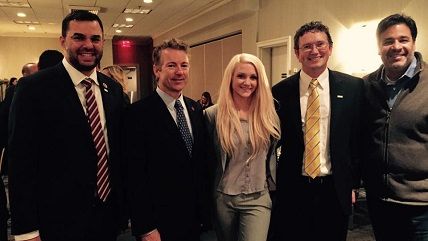Who Decides Whether Rand Paul's Libertarian Girl Has 'Fringe' Foreign Policy Views?
Lindsey Graham: 'Rand Paul has been more wrong on ISIS than Obama has.'


The Daily Beast's Olivia Nuzzi—a political reporter who frequently writes about Sen. Rand Paul's likely presidential campaign—recently tweeted the following:
Just ran into Lindsey Graham who told me "Rand Paul has been more wrong on ISIS than Obama has."
— Olivia Nuzzi (@Olivianuzzi) January 22, 2015
Chew on that for a minute—we will revisit it.
Nuzzi has also covered the very minor firestorm over Paul's hiring of Marianne Copenhaver (a.k.a. "Libertarian Girl") to assist with his social media operations. The Washington Free Beacon, an unabashedly neoconservative outlet, drew attention to some of Copenhaver's previous statements that Free Beacon reporter Alana Goodman evidently considered scandalous. I wasn't remotely convinced that Copenhaver's views—opposition to war, praise for Edward Snowden, criticism of the Pledge of Allegiance, skepticism of Israeli foreign policy, harsh words for Senators John McCain and Lindsey Graham—are objectively controversial. While not all libertarians share them, or share them as strongly, certainly some do. (I reached out to Copenhaver, but she declined to discuss the matter further.)
But there's no such thing as a non-controversial opinion, I suppose, if it's picked up by major media players and endlessly touted as something scary. Nuzzi wrote:
While inside the Peppermill, I watched as Copenhaver drafted a tweet on her iPhone from Paul's personal Senate account. She showed it to Stafford for approval, and he gave her the go-ahead to send it to the senator's 534,000 followers.
A close reading of Copenhaver's social-media history now has some asking whether or not Paul's decision to saddle her with such responsibility speaks well of his judgment.
Who are the "some"? The Free Beacon and Jennifer Rubin. Rubin likened Copenhaver to Jack Hunter, a previous Paul campaigner who was fired after his long-ago support for the Confederacy came to light. (Hunter has repeatedly apologized for his past and disavowed those statements; he is now an editor at the libertarian-leaning site, Rare.) Rubin wrote:
This is, of course, very reminiscent of his office's hiring of the Southern Avenger, a pro-Confederate blogger, whom Paul originally defended and later was forced to part company with. Moreover, it is one more indication that Paul World operates well outside the lines of mainstream, serious national campaigns.
Why is it that he attracts people with these outlandish views? Well, for one thing Paul suggests that he might agree with some of them. While not using an expletive to describe McCain, he repeated a slanderous and already disproved lie that McCain had met with Syrian jihadists. And while not recommending Snowden for a Nobel Peace Prize, he did compare him to another winner, the Rev. Martin Luther King Jr. One might expect that people who espouse the views Paul does and who traffic in smears attract people very far off the political spectrum.
Nuzzi, at least, disputed this equivalency while still characterizing Copenhaver's views as fringe:
My mentioning Hunter is not, I should note, meant to conflate praising Edward Snowden or denouncing John McCain with complimenting John Wilkes Booth, but to highlight the fact that Paul does, as Rubin contends, often find himself surrounded by "fringe" characters, and it has been and will likely continue to be a serious political problem for him.
The problem, of course, is this: who gets to decide which views are fringe? If it's Jennifer Rubin, then yes, any Republican who expresses reluctance to become involved in another war in the Middle East—or associates with people strongly critical of such action—would be labelled fringe. And if fringe is defined by degree of dissent from those in power—from the gung-ho Obama administration and Congressional leaders of both parties—the noninterventionist view is certainly fringe.
But I'm far from convinced that Paul's core views on foreign policy and civil liberties are at odds with the American people—many of whom were furious, not with Edward Snowden, but at the abuses he uncovered. Many Americans think ISIS has committed unspeakable crimes and are fine with taking them out, but have serious doubts about the viability of the U.S. military's long-term strategy there. As recently as October 22, 47 percent of Pew poll respondents were concerned that anti-ISIS efforts would go too far. A lesser number, 43 percent, were concerned the efforts wouldn't go far enough. Given the constantly changing nature of the conflict, and the flip-flopping tendencies of the electorate's foreign policy views, one shouldn't read too much into these numbers. And yet it seems to me that most people are still making up their minds about the important foreign policy and civil liberties issues of the day.
This debate is reflected in the deep foreign policy divide within the Republican Party. And with representatives of the libertarian, authoritarian, and moderate camps preparing for battle in the GOP presidential primaries, the disagreements will only grow more pronounced.
That's why the "fringe" label is such an important weapon—the neoconservative faction of the GOP will wield it in an attemp to keep libertarian noninterventionists at bay. And that is the significance of Graham—a hawk as war-hungry as they come—asserting that Paul is more wrong about ISIS than Obama. He wants Republicans to think that Paul is a completely delusional fringe candidate with less of a grip on the world than the president. It's a message to other Republicans: denounce this charlatan and his crazy followers.
To win the debate, libertarians must make even stronger arguments—they must show that their positions are not fringe, but rather, increasingly represent the sentiments of ordinary folks all over the country if not the powerful in Washington. Because every quarrel between libertarians and neocons—even one as trivial as Libertarian Girl's unremarkable social media history—is likely to land in the national media spotlight as a new front in the GOP foreign policy civil war.
Reason devoted its January issue to the libertarian foreign policy debate. Read Matt Welch's interview with Rand Paul—which tackled ISIS, war authorization, and more—here.


Show Comments (200)